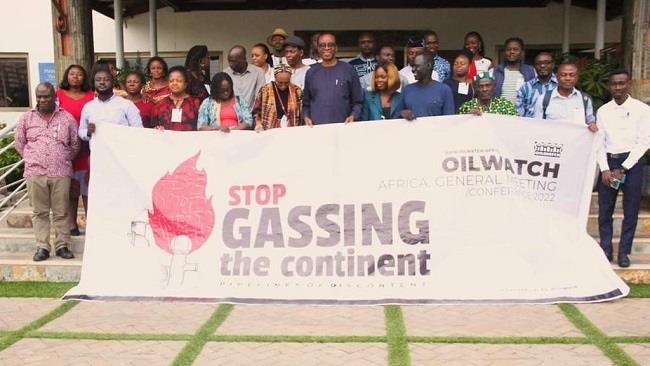The continuous financing and development of massive pipeline projects in Africa constitute an aggression on the land rights of communities and portend massive livelihood disruptions, conflicts, human rights abuses, and environmental degradation across the continent.

This submission was made by a team of activists under the aegis of the Oilwatch Africa (OWA) at their 2022 Conference and Annual General Meeting held in Accra, Ghana from August 8 to 12. The theme of the gathering was: “Stop Gassing the continent: Pipelines of Discontent.”
While listing such projects to include the East African Crude Oil Pipeline (EACOP), the West African Gas Pipeline (WAGP), and the Trans-Saharan Gas Pipeline, they flayed the current rush for Africa’s oil, gas and mineral resources, stating that it amounts to a perpetuation of extractive modes of colonial exploitation, which condemned the continent to predatory slave trade, followed by the raping of agricultural and forest resources, before the current iteration with its focus on minerals and fossil fuels.
They frowned at the current trend in which multinational oil and gas companies sell off their stakes in onshore oil and gas assets and move out of African countries or further offshore, saying that it amounts to an abdication of responsibility for historical damage caused by their activities in these countries.
The campaigners described the Paris Agreement and the 1.5 degrees Celsius target as driven by the Nationally Determined Contributions (NDCs) as “a huge betrayal for Africa”, which they claim warms at about 50% above the global average.
“It means that, going by the NDCs, Africa is condemned to literally burn at the best of scenarios,” the delegated said in a communique released at the close of the gathering.
They insisted that Africa is rich in renewable energies and, given the growing competitiveness of clean energy technologies, the continent has the potential to advance its energy transition along a zero-carbon pathway.
“For instance, Africa has the world’s highest solar potential but currently accounts for just one,” they said, while lamenting that industrialised countries have demonstrated insincerity by routinely spending close to $2 trillion annually on military hardware and warfare while foot-dragging on climate commitments, especially adaptation finance.
Generally, Oilwatch Africa officials denounced efforts to “lock Africa in the exploitative fossil fuels pathway to meet the energy needs of polluting nations and to feed the greed of the fossil fuels industry”.
To ensure a just transition and secure climate justice for the African people, they made the following demands:
- There must be a halt to all new coal, oil, or gas exploration and extraction activities in Africa in line with the imperatives of the energy transition. We specifically demand the stoppage of oil exploration and expansion plans in the Virunga basin of the DRC, the Keta region of Ghana, the Okavango Delta of Botswana, the Orange River Basin in Namibia, and a halt on all plans for the West African Gas Pipeline Project, the Trans-Saharan Gas Pipeline Project, and the East African Crude Oil Pipeline Project, among others.
- That African governments must leverage the hosting of COP27 this year to demand far-reaching measures on climate adaptation and finance, including emissions cut at the source.
- African governments should demand from polluting industrialised countries an annual climate debt of $2 trillion being the amount they currently spend on military hardware and warfare annually. This will pay for loss and damage and serve as partial reparations for historical harms.
- That oil and gas multinationals currently planning to divest and escape responsibility for their historical damage to African communities (such as Shell and Exxon Mobil in Nigeria’s Niger Delta) should restore the environment and compensate communities for ecocide committed in their territories before their exit.
- African states must develop Africa-centred and just energy transition plans where such do not exist and where they do, to mainstream such plans into broader national development plans in ways that take cognisance of Africa’s huge renewable potential
- African countries and the African Union must tread with caution to the so-called blue economy, and especially denounce unconditionally all attempts to normalise Deep Seabed Mining (DSM) within the continent.
- International Financial Institutions, including the African Development Bank and export credit agencies to cut all financing to fossil fuel projects in Africa.
- African governments and international organisations to respect the right to life of human rights and Eco-defenders in the continent who are increasingly repressed.
